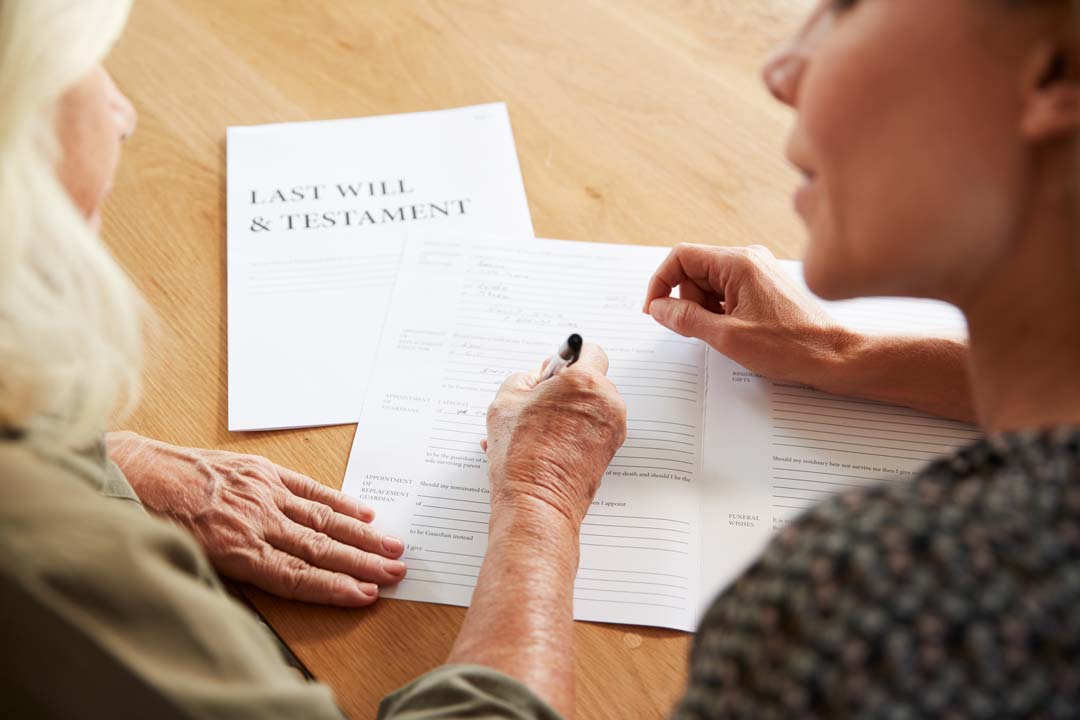Writing a Will and planning for the distribution of your assets after your death is an essential part of responsible financial management.
While it may not be the most pleasant thing to think about, having a comprehensive estate plan can provide peace of mind for both you and your loved ones. However, the process of creating a Will and managing an estate can be complex and confusing, which often leads to a variety of common questions.
In this blog post, we will explore some of the most common questions about Wills and estates, and provide clear, straightforward answers to help demystify this important area of personal finance.
Whether you’re just starting to think about your estate plan, or you’re on the other side and want to understand the process more in the outcome of someone’s death, this guide will provide valuable insights and information to help you navigate the Wills and Estates process with confidence.
What is a Will and why is it important?
We have written a comprehensive guide to Wills here, that has a lot of this information for you, but here’s a summary about a Will:
A Will is a person’s last will and testament; a legal document that outlines their wishes for the distribution of their assets after their death.
It is a written statement of how that person wants their property and assets to be distributed and who should manage the process of distributing them.
A Will typically includes information such as:
- the names of the beneficiaries who will receive the assets,
- the specific assets that will be distributed, and
- the person or organization responsible for managing the distribution of the assets (known as the executor).
How do I write a Will?
You should never attempt to write a write your own will or use a will kit as there are risks that the will may not be valid. The best way is to work with a qualified Wills and Estates planning lawyer who can guide you through the process and provide you with advice on how to distribute your assets to your loved ones.
We’d strongly recommended that you consult with a solicitor to ensure that your will is properly drafted and executed.
Who should be the Executor of my Will?
Choosing an Executor for your Will is an important decision that should be made carefully. They’re responsible for administering your estate after you die and will be required to take responsibility for gathering and valuing your assets, paying any debts and taxes, and distributing your assets to your beneficiaries.
Here are some factors to consider when choosing an Executor for your Will:
- Trustworthiness: You should choose someone you trust to act in your best interests. Your Executor should be honest, reliable, and capable of managing your estate.
- Availability: Your Executor should be willing and able to serve as Executor and should have the time and availability to carry out the duties required. It is also a good idea to choose someone who lives in the same state as you.
- Age: Your Executor should be of legal age (18 years old in Victoria) and not be too old or ill to fulfil their duties.
- Relationship to you: You may want to consider choosing someone who is familiar with your personal and financial affairs, such as a family member or close friend. However, you should also consider the potential for conflicts of interest or other issues that may arise.
It is also a good idea to choose an alternate Executor in case your first choice is unable or unwilling to serve as Executor when the time comes. You should also discuss your choice with your proposed Executor and ensure they are willing to take on the role before including them in your Will.
What happens if I die without a Will?
If you pass and you don’t have a Will, your assets and property will be distributed according to the intestacy laws of Victoria. Intestacy laws determine how your property will be divided and may not reflect your wishes.
Under these laws, your assets will be distributed to your surviving relatives in a specific order. Please refer to our Intestacy guide for further information.
As intestacy laws do not consider any preferences or wishes you may have had regarding the distribution of your assets, and may not be appropriate for your individual circumstances, we strongly recommend you create a Will to ensure your property and assets are distributed according to your wishes.
How do I change of revoke a Will?
To make changes or revoke a Will it’s best to work with a Wills and Estates planning lawyer to ensure your changes are valid and properly executed after your passing.
To change a Will you can create a codicil; a legal document that modifies or supplements your existing Will. This is a great option if there is one of more minor change, however if you have a large number of changes to your Will a better option would be to write a new one. A new Will automatically revokes an old Will.
How do I distribute my assets through a Will?
Your assets will be distributed by your Executor, as per your wishes in your Will. However, your Will can only distribute assets that you own in your sole name.
Assets that do not form part of your estate and therefore are not capable of being distributed by your Will include the following:
- Jointly owned assets
- Assets held by Private Companies
- Assets held in Family Trusts
That’s why it’s important to work with a qualified and experienced Wills & Estate planning lawyer to ensure that the assets you wish to distribute are capable of being distributed in your Will and to ensure that your wishes are carried out accurately.
What are the tax implications of a Will?
There may be tax implications passing on assets through your will.
Capital gains tax (CGT) and Stamp duty:
If property is given to beneficiaries in accordance with the will, no capital gains tax or stamp duty will be payable by the estate or beneficiaries at the time. However, capital gains tax may be payable by the beneficiaries when they dispose of the property at a later date. There are exceptions to this situation and it is therefore important to seek tax advice.
Inheritance tax:
There is no inheritance tax in Australia, so beneficiaries generally do not have to pay tax on the assets they inherit from an estate.
How do I handle a Trust that is created in my Will?
Handling Trusts in your Will involves several steps:
- Determine if a Trust is necessary: You may want to create a trust if you have minor beneficiaries, beneficiaries with special needs, or if you want to control how and when your assets are distributed after your death.
- Choose a trustee who will manage the trust assets and distribute them according to your wishes.
- Specify the terms of the trust, including the beneficiaries, the distribution of assets, and any conditions or restrictions on the distribution of assets.
Review and update regularly to ensure that it reflects your current wishes and circumstances.
An experienced Wills and Estates lawyer can help.
What is the probate and estate administration process?
The probate and estate administration process can be complex, so it is important to seek professional advice if you are named as an executor in the Will.
Here is a guide to the Probate and Estate Administration process.
The Executor is responsible for administering the estate and ensuring that the wishes of the Testator are carried out.
An executor’s responsibilities include:
- Applying for a Grant of Probate;
- Gathering the estate assets, paying liabilities and managing the relevant tax affairs;
- Preserving and maintaining the assets of the estate;
- Defending the estate during any legal proceedings; and
- Distributing the estate in accordance with the deceased’s Will.
How can I ensure that my Will is legally binding?
To ensure that a Will is valid in Victoria, there are several requirements that must be met. The Will must be:
– in writing;
– signed by the person making it (the “testator”);
– signed by the testator in the presence of 2 witnesses aged over 18, present at the same time; and
– signed and attested to by the witnesses in the presence of the testator.
We’d strongly recommend you seek legal advice from a Wills & Estates Planning Lawyer when creating a Will to ensure that all legal requirements are met and to minimize the risk of any challenges to the Will’s validity.
How do I contest a Will?
Contesting a Will involves challenging its validity. The reasons for doing so may include:
- If the person who made the Will (the Testator) did not have the mental capacity to make a valid Will, the will may be contested. This could be due to a mental illness, dementia, or other medical conditions that affected their ability to make decisions.
- Undue Influence: If the testator was unduly influenced by someone when making the Will. This could be due to pressure or coercion from someone.
- Fraud or Forgery
You may also be eligible to challenge the Will if the Will does not provide adequate provision for your proper maintenance and support.
Please see our guides for further information.
Contesting a will can be a complex legal process that requires a thorough understanding of the relevant laws and evidence. It’s important to seek legal advice from an experienced lawyer who can guide you through the process and represent you in court if necessary.
In Victoria, only certain eligible people can contest a Will. This includes:
– Spouses and domestic partners
– Children, stepchildren
– grandchildren (must have been wholly or partly dependent on the deceased for proper maintenance and support)
If you wish to contest a Will, you can file a claim with the Supreme Court of Victoria, known as a ‘Family Provision Claim’ and is governed by the Administration and Probate Act 1958 (Vic).
You will need to provide evidence to support your claim which may include financial and/or medical records and other documentation.
Before making such a claim we strongly recommend obtaining legal advice from a Wills & Estate Lawyer to understand the merits of your claim.
Contesting a will in Victoria can be a complex and a costly process. It’s important to seek legal advice from an experienced lawyer who can guide you through the process and represent you in court, if necessary.
Can I make a Will online?
Making a Will online or using a Will Kit can be a convenient and cost-effective option however there are risks of doing so such as:
- As it’s a precedent the Will that is not tailored to your specific circumstances may not be legally binding or may not adequately reflect your wishes.
- While some online Will-making services may provide templates or guidance to help you create a Will, they will not offer the same level of legal expertise and advice that a lawyer can provide. This will increase the risk of errors or omissions that could result in legal challenges or disputes over the Will.
- The security and confidentiality of your personal information and the contents of your Will may be at risk if you use an online service that does not provide adequate safeguards.
- Consider that some online services may not provide templates or solutions that are relevant to Victoria, Australia.
It is important to carefully consider your options and seek legal advice if you have any doubts or concerns.
Please refer to our article for further information: The risks of writing your own Will – Hunt & Hunt Lawyers (hunthunt.com.au)
Writing a Will is an important step to ensure your assets are distributed according to your wishes after you die. Selecting to work with a Wills & Estates planning Lawyer will ensure that your Will is properly executed and meets all legal requirements, to minimize the potential for disputes or challenges to your Will.
Ultimately, the decision to write a Will is a personal one, but it is important to consider the potential consequences of not having a Will in place. By taking the time to create a Will and seeking the guidance of a lawyer, you can ensure that your assets are distributed in a way that reflects your wishes and helps to provide for your loved ones after you are gone.
If you would like help organising a Will please get in touch with our Wills & Estates Planning lawyers.
Who should be the executor of my Will?
Choosing an Executor for your Will is an important decision that should be made carefully. They’re responsible for administering your estate after you die and will be required to take responsibility for gathering and valuing your assets, paying any debts and taxes, and distributing your assets to your beneficiaries.
What happens if I die without a Will?
If you pass and you don’t have a Will, your assets and property will be distributed according to the intestacy laws of Victoria. Intestacy laws determine how your property will be divided and may not reflect your wishes.
How do I change or revoke a Will?
To change a Will you can create a codicil; a legal document that modifies or supplements your existing Will. This is a great option if there is one of more minor change, however if you have a large number of changes to your Will a better option would be to write a new one. A new Will automatically revokes an old Will.
How do I distribute my assets through a Will?
Your assets will be distributed by your Executor, as per your wishes. That’s why it’s important to work with a qualified and experienced Wills & Estate planning lawyer to ensure your wishes are carried out accurately and reduce opportunity for your Will to be contested.
What are the tax implications of a Will?
Assets passed through in a Will are subject to tax implications such as Capital Gains tax, Stamp duty and Superannuation tax.
How do I handle trusts and estates in my Will?
Determine if a Trust is necessary. If it is, choose a Trustee and specify the terms of the trust. For administering an estate you will need to appoint an Executor.
What are the probate and estate administration process?
The first step is to identify the Executor named in the Will. The Executor is responsible for administering the estate and ensuring that the wishes of the Testator are carried out.
The Executor must obtain a Death Certificate and apply for a Grant of Probate from the Supreme Court of Victoria.
The Executor must identify all the deceased's assets, such as property, bank accounts, and investments, and determine their value as at the date of death.
The Executor must pay any outstanding debts, such as funeral expenses, and settle any outstanding tax liabilities of the deceased.
The Executor can distribute the remaining assets to the beneficiaries named in the Will.
Once all assets have been distributed, the executor must finalize the estate by closing any bank accounts, cancelling any credit cards or memberships, and notifying any relevant government agencies and service providers.
How can I ensure that my Will is legally binding?
To ensure that a Will is legally binding in Victoria, there are several requirements that must be met:
- The person creating the Will, known as the Testator, must be 18 years of age or older and of sound mind.
- The Will must be in writing and signed by the testator in the presence of two witnesses, who must also sign the Will.
- The witnesses must be 18 years of age or older and must not be beneficiaries under the Will.
- The testator must have intended to create a Will that would take effect after their death.
- The Will must be kept in a safe place and easily accessible to the executor after the Testator's death.
- The Will must not have been revoked or invalidated by any subsequent acts of the Testator
How do I contest a Will?
Contesting a Will involves challenging its validity. If you wish to contest a Will, you can file a claim with the Supreme Court of Victoria, known as a 'Family Provision Claim' and is governed by the Administration and Probate Act 1958 (Vic).














